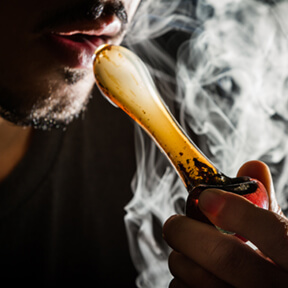Marijuana, Cigarettes, Cooking Odors and Other Nuisances…
What’s an association to do when presented with complaints from residents about their neighbors? What tools does an association have to respond to the complaints or to craft some mitigation plan? When must an association take remedial action?
Both the New Jersey Condominium Act, N.J.S.A. 46:8B-1 et seq., and the Planned Real Estate Development Full Disclosure Act (PREDFDA), N.J.S.A. 45:22A-21 et seq., require associations to provide a fair and efficient alternate dispute resolution (ADR) for unit owners to resolve “housing-related” (meaning not personal, but related directly to association living) disputes between one another or with the association. Although the majority of ADR matters may be between owners and the board, these provisions are applicable to association-related disputes between owners.
Unlike the board, which must participate if an ADR is requested, a unit owner cannot compel another unit owner to participate in an ADR proceeding. Presented with complaints between neighbors or with offensive conduct by a resident, boards must offer a forum and attempt dispute resolution as the relevant statutes require. Even where participation is obtained, the outcome is not binding. So, even with the most vexing nuisance disputes, without voluntary mitigation of offending behavior by the offending resident, ADR is not likely to end the dispute.
 A private nuisance has been defined as a circumstance of property — like excessive noise or a noxious or offensive vapor, dust or vibration — which rises to the level of an annoyance so as to materially interfere with the ordinary comfort of human existence. Ross v. Denan, 101 N.J. Eq. 281,283 (E & A, 1927). Since at least 1868, New Jersey Courts have contemplated what degree of annoyance would constitute a nuisance. In Ross v. Butler, 19 N.J. Eq. 294, 306 ( Ch. Div. 1868), the Court wondered,
A private nuisance has been defined as a circumstance of property — like excessive noise or a noxious or offensive vapor, dust or vibration — which rises to the level of an annoyance so as to materially interfere with the ordinary comfort of human existence. Ross v. Denan, 101 N.J. Eq. 281,283 (E & A, 1927). Since at least 1868, New Jersey Courts have contemplated what degree of annoyance would constitute a nuisance. In Ross v. Butler, 19 N.J. Eq. 294, 306 ( Ch. Div. 1868), the Court wondered,
…what degree or amount of discomfort is necessary to constitute a nuisance. It is clear that everything that renders the air a little less pure, or is to any extent disagreeable, is not necessarily a nuisance. The smoke that may, in certain conditions of the atmosphere, descend from a neighbor’s chimney, the fumes that may sometimes be wafted from his kitchen, though not desirable or agreeable, are not a nuisance… there is a debatable ground, on which it may be difficult to fix the exact point at which the smoke or smell becomes a nuisance in the eye of the law.
The Restatement (Second) of Torts, S 821D defines a common law nuisance to be “a nontrespassory invasion of another’s interest in the private use and enjoyment of land.” To be actionable at law, the nuisance must substantially interfere with the enjoyment of the property. The interference must be unreasonable.
 In Shimp v. New Jersey Bell Telephone Company, 145 N.J. Super 516, (Ch. Div., 1976) the Appellate division recognized the harm done to workers exposed to second-hand smoke and established the common law right of employees to be protected from that harm while on the job. In its ruling, the Court took judicial notice of the generally accepted fact of the toxic nature of cigarette smoke and its well-known association with emphysema, lung cancer and heart disease as evidenced by the national policy to warn the public of the dangerous nature of cigarette smoke. (The Public Health Cigarette Smoking Act of 1970, 15 U.S.C.A. s. 1331 et seq. was cited in the opinion.) In its opinion, the Court concluded that “cigarette smoke contaminates and pollutes the air, creating a health hazard not merely to the smoker but to all those around her who must rely upon the same air supply.” Shrimp at 528.
In Shimp v. New Jersey Bell Telephone Company, 145 N.J. Super 516, (Ch. Div., 1976) the Appellate division recognized the harm done to workers exposed to second-hand smoke and established the common law right of employees to be protected from that harm while on the job. In its ruling, the Court took judicial notice of the generally accepted fact of the toxic nature of cigarette smoke and its well-known association with emphysema, lung cancer and heart disease as evidenced by the national policy to warn the public of the dangerous nature of cigarette smoke. (The Public Health Cigarette Smoking Act of 1970, 15 U.S.C.A. s. 1331 et seq. was cited in the opinion.) In its opinion, the Court concluded that “cigarette smoke contaminates and pollutes the air, creating a health hazard not merely to the smoker but to all those around her who must rely upon the same air supply.” Shrimp at 528.
Nevertheless, in the New Jersey Smoke Free Air Act (effective April 15, 2006), while finding and declaring that tobacco smoke is the leading cause of preventable death in the State and that it causes a substantial health hazard to the nonsmoking majority of the public, private homes were specifically excluded from the smoking ban. N.J.S.A. 26:3D-55 et seq.
How do community associations typically address nuisance situations?
 Community association governing documents typically contain language similar to the following passage:
Community association governing documents typically contain language similar to the following passage:
“No noxious or offensive activities or noise shall be carried on or allowed, in or upon the Common Elements or in any Unit nor shall anything be done therein either willfully or negligently which may be or become an annoyance or nuisance to the other residents in the Condominium,” or;
“No noise or other nuisances shall be permitted to exist or operate upon any such property so as to be offensive or detrimental to any other property or to its occupants.”
Terms such as “annoyance” or “detrimental” are not usually defined in governing documents, nor do they establish the degree to which actions must annoy or cause detriment to be acted upon. For these reasons, governing documents that rely on general restrictions to prohibit smells, smoke, etc. can be difficult for a board to administer. The terms are subjective; one person’s slight annoyance can be a major source of discomfort to another. A board may deem the restriction to imply that the annoyance must be substantial while the annoyed resident may interpret the language differently. Every case becomes very fact-specific.
 Restrictions such as these may be the only basis for the association’s board to regulate behavior within a unit that is the subject of a complaint when otherwise purely private, like smoking tobacco, burning incense, or smoking prescribed marijuana. On the Official Site of the State of New Jersey in “Guidelines for Patients and Caregivers,” it is “encouraged” that patients use medicinal marijuana “only in their residence” and notes that “the smell of burning or raw marijuana outside a home will attract law enforcement attention.”
Restrictions such as these may be the only basis for the association’s board to regulate behavior within a unit that is the subject of a complaint when otherwise purely private, like smoking tobacco, burning incense, or smoking prescribed marijuana. On the Official Site of the State of New Jersey in “Guidelines for Patients and Caregivers,” it is “encouraged” that patients use medicinal marijuana “only in their residence” and notes that “the smell of burning or raw marijuana outside a home will attract law enforcement attention.”
An association has an obligation to provide a forum to try to resolve a dispute amicably through ADR when faced with alleged nuisance situations between residents. Additionally, the association may have an affirmative obligation to act either: to enforce the restrictions found in its governing documents; or because the nuisance situation involves areas of the community under the control or administration of the association.
Vague language in governing documents creates uncertain outcomes in courts
In March 2013, an Orange County, CA jury found a homeowners’ association negligent for failing to resolve a secondhand smoke dispute between neighbors. In Chauncey v. Bella Palermo Homeowners’ Association, et al., OCSC Case No. 30-2011-00461681, Chauncey alleged that the neighbors and their visitors smoked incessantly on their patio next to the family’s unit and adjoining sidewalks in front of their home, resulting in the constant infiltration and presence of secondhand smoke entering their unit through windows and a sliding-glass door. Chauncey said the smoke aggravated their young son’s asthma. They alleged and apparently the jury concluded that they had made repeated complaints to the homeowners association, the management company, the tenants and the unit owner but none of them did anything to stop the problem. The governing documents contained a restriction that declared that “no noxious or offensive trade or activity shall be permitted upon any part of the covered property, nor shall anything be done thereon which shall in any way interfere with the quiet enjoyment of each of the owners of his respective residence.” The jury awarded Chauncey monetary damages against the association.
 On the other hand, in Ewen v. Maccerone, 927 N.Y.S.2d 274; 32 Misc.3d 12 (2011), plaintiff owners of a luxury condominium in Manhattan commenced an action against their neighbors alleging negligence and nuisance as a result of second-hand smoke seeping into their apartment from defendants’ excessive smoking which was exacerbated by “odor migration” through walls due to the building construction and ventilation system. The association was not named as a party. The condominium’s governing documents did not prohibit smoking in the individual units. In finding for the defendant neighbors, the Court stated, “not every intrusion will constitute a nuisance. ‘Persons living in organized communities must suffer some damage, annoyance, and inconvenience from each other… If one lives in the city he [or she] must expect to suffer the dirt, smoke, noisome odors and confusion incident to city life’” (Nussbaum v Lacopo, 27 NY2d at 315, quoting Campbell v Seaman, 63 NY 568, 577 [1876]).
On the other hand, in Ewen v. Maccerone, 927 N.Y.S.2d 274; 32 Misc.3d 12 (2011), plaintiff owners of a luxury condominium in Manhattan commenced an action against their neighbors alleging negligence and nuisance as a result of second-hand smoke seeping into their apartment from defendants’ excessive smoking which was exacerbated by “odor migration” through walls due to the building construction and ventilation system. The association was not named as a party. The condominium’s governing documents did not prohibit smoking in the individual units. In finding for the defendant neighbors, the Court stated, “not every intrusion will constitute a nuisance. ‘Persons living in organized communities must suffer some damage, annoyance, and inconvenience from each other… If one lives in the city he [or she] must expect to suffer the dirt, smoke, noisome odors and confusion incident to city life’” (Nussbaum v Lacopo, 27 NY2d at 315, quoting Campbell v Seaman, 63 NY 568, 577 [1876]).
The relevant question is whether a defendant’s use of his or her property constitutes an unreasonable and “continuous invasion of [the plaintiff’s property] rights” (Domen Holding Co. v Aranovich, 1 NY3d 117, 124 [2003]; see Golub v Simon, 28 AD3d 359, 360 [2006]; Rodriguez-Nunci v Clinton Hous. & Dev. Co., 241 AD2d 339, 340 [1997]). The Court took notice of the fact that the plaintiff had failed to include the association as a defendant in the matter although they alleged that building issues contributed to the problem. Thus, there could be no award against the association (since it was not a party), nor against the neighbors for allegations of building deficiencies (since they had no control over the building or construction).
In Schuman v Greenbelt Homes, Inc., 212 Md. App. 451 (2011), Schuman brought suit against a cooperative housing association and a neighbor alleging nuisance, negligence, and trespass as a result of second-hand smoke entering Schuman’s patio and unit from the neighbors’ cigarette smoking. The association’s membership contract stated that members will respect the comfort and peace of mind of neighbors and not engage in activities that are a nuisance, annoying, or inconvenient to other members.
Prior to the lawsuit, in an effort to mitigate Schuman’s exposure to the smoke and quell his complaints, the association sealed cracks in the walls between the units and had hired an industrial hygienist to test the air. At that time, no detectable level of nicotine was found and the parties thought the problem was resolved. Sometime later, after some renovations to the unit, Schuman again complained of smoke migration into his unit. In response, the neighbors purchased a new air filter and the association sealed cracks again. Not satisfied, the plaintiff filed his complaint.
During the course of the litigation, the neighbors agreed to refrain from smoking inside of their unit and agreed to limit their smoking to outside. Nevertheless, the plaintiff asked for injunctive relief prohibiting the neighbor from smoking outside. The plaintiff argued that any amount of secondhand smoke was harmful and annoying and therefore should constitute a nuisance. The court, while acknowledging the various surgeon general warnings and reports regarding the harmful effects of secondhand smoke, explained that nevertheless, secondhand smoke was not a “nuisance per se.” That is, “an act, occupation, or structure which is a nuisance at all times and under any circumstances regardless of location or surroundings” (citing Maryland cases).
The Court took note of the fact that smoking was not prohibited in the membership contracts; that smoking in private homes was a specific exception from the relevant smoking ban statutes dealing with work and public spaces, and because the harm from second-hand smoke was only a potential risk. Finally, demonstrating the fact-specific nature of nuisance cases, the Court in Schuman concluded that according to the testimony, the neighbor only smoked 4 to 6 cigarettes per evening. Based on that evidence, the trial court could have reasonably concluded that there was insufficient evidence of any substantial or unreasonable interference with the use and enjoyment of Schuman’s property.
Amendment of the association’s master deed or declaration to include a smoking ban within the community including within private homes would provide the strongest option for successfully imposing a total smoking ban in a community. Such amendments typically require a high degree of approval and participation by the membership and as such, would have the strongest case possible if challenged in court. However, short of that, association boards have the duty and authority to administer the common elements.
Reasonable restrictions on smoking may be adopted as consistent with that authority by the Board pertaining to common elements so long as the restrictions are reasonable under the circumstances. Whether general common element outdoor smoking bans would be considered reasonable would vary by the facts and circumstances existing in each community. How well such bans can be enforced once adopted and whether such bans are desirable is a different discussion.
What is Reasonable Accommodation?
Both the federal fair housing laws and the state law against discrimination require associations to make reasonable allowances for changes or exceptions to rules when such reasonable accommodation is necessary to afford a disabled person an equal opportunity to use and enjoy his or her home. In New Jersey, these requirements might impact an association’s restrictions or lack thereof regarding smoking, whether tobacco or marijuana.
 For example, if a resident has a disability which is exacerbated by contact with smoke, would a reasonable accommodation be adoption and enforcement of a ban? On the other hand, if a resident has been prescribed marijuana for use as a medical treatment, would an association ban on marijuana smoke be enforceable? Marijuana use for either medical or recreational purposes is still illegal under federal law. On January 11, 2011, the United States Department of Housing and Urban Development (HUD) issued a memorandum addressing medical marijuana use and reasonable accommodation in Federal Public and Assisted Housing. It was HUD’s conclusion in that memorandum that Public Housing Agencies are not required to grant accommodations for medically necessary marijuana use because marijuana is characterized as a schedule 1 substance under the Controlled Substance Act. (21 U.S.C., SS 801, et seq.) There have been no reported New Jersey cases that would suggest whether New Jersey courts would view a request for accommodation for medical marijuana use as reasonable or whether an applicant would not be entitled to such accommodation because such use is still an illegal drug.
For example, if a resident has a disability which is exacerbated by contact with smoke, would a reasonable accommodation be adoption and enforcement of a ban? On the other hand, if a resident has been prescribed marijuana for use as a medical treatment, would an association ban on marijuana smoke be enforceable? Marijuana use for either medical or recreational purposes is still illegal under federal law. On January 11, 2011, the United States Department of Housing and Urban Development (HUD) issued a memorandum addressing medical marijuana use and reasonable accommodation in Federal Public and Assisted Housing. It was HUD’s conclusion in that memorandum that Public Housing Agencies are not required to grant accommodations for medically necessary marijuana use because marijuana is characterized as a schedule 1 substance under the Controlled Substance Act. (21 U.S.C., SS 801, et seq.) There have been no reported New Jersey cases that would suggest whether New Jersey courts would view a request for accommodation for medical marijuana use as reasonable or whether an applicant would not be entitled to such accommodation because such use is still an illegal drug.
Either way, upon presentation of issues of nuisance, whether from smoke or some other odor or behavior, the association should undertake efforts to investigate and resolve the dispute through ADR whenever possible and determine whether any building-related or common element related issues are presented so that nuisance complaints don’t turn into negligent complaints against the association.
